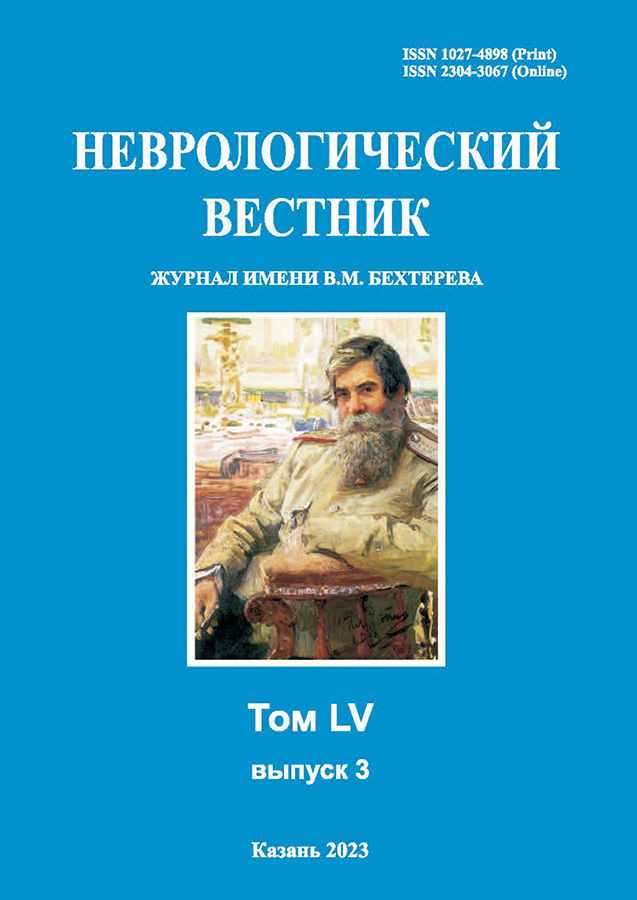Coping strategies for residents of the Republic of Karelia with autonomic nervous system
- Authors: Mikhailov V.A.1, Hyanikyaynen I.V.2, Rzheutskaya N.A.2
-
Affiliations:
- V.M. Bekhterev National Medical Research Center of Psychiatry and Neurology
- Petrozavodsk State University
- Issue: Vol LV, No 3 (2023)
- Pages: 31-39
- Section: Original study arcticles
- Submitted: 30.08.2023
- Accepted: 04.09.2023
- Published: 15.09.2023
- URL: https://journals.eco-vector.com/1027-4898/article/view/568940
- DOI: https://doi.org/10.17816/nb568940
- ID: 568940
Cite item
Abstract
AIM. To analyse thе coping strategies leading to psychological maladjustment and the occurrence of autonomic nervous system disorders (ANSD) in residents of the Republic of Karelia (RK).
METHODS. Heart rate variability (cardiointervalography, rhythmography, spectral analysis) and coping strategies (adapted Lazarus coping test) were studied in 104 residents of RK suffering from ANSD (main group — MG; sex index 1:1; mean age 36.8±10.7 years) and in healthy control subjects (CG; n=30; sex index 1:1; mean age 36.1±5.5 years; p=0.761).
RESULTS. It was found that the residents of RK with ANSD are statistically significantly (p <0,05) characterised by sympathicotonia in combination with high tension of such emotionally oriented coping strategies as “escape-avoidance” (in men — 47,52±7,05/40,27±5,04%; in women — 47,46±9,47/46,13±8,68% in persons of the MG/CG, respectively) without gender differences (p >0,05). Women used more often (p <0,05) use “distancing” (50,67±10,09/43,07±7,56%; p=0,009) and “taking responsibility” (46,65±7,8/40,27±5,04%; p=0,002); whereas men underestimated (p <0,05) the coping strategy “planning” (49,88±8,2/56,4±6,31% in MG and CG; p=0,004).
CONCLUSIONS. For the primary and secondary prevention of ANSD in RK residents, it is advisable to take into account the specifics of heart rate variability (sympathicotonia) and coping strategies (emotionally oriented), which will optimise psychological adaptation to the disease through personalised rehabilitation programmes based on a biopsychosocial approach (a combination of pharmacological and psychological — psychotherapeutic correction).
Full Text
About the authors
Vladimir A. Mikhailov
V.M. Bekhterev National Medical Research Center of Psychiatry and Neurology
Email: vladmikh@yandex.ru
ORCID iD: 0000-0001-6002-2015
SPIN-code: 5563-1009
M.D., D. Sci. (Med.), Prof., Vice-Director of the SMRC PN of the V.M. Bekhterev for innovative scientific cooperation, Chief Researcher, Scientific Director, Depart. of Integrative Therapy of Patients with Neuropsychiatric Profile, Depart. of exogenous organic disorders and epilepsy
Russian Federation, St. PetersburgIgor V. Hyanikyaynen
Petrozavodsk State University
Author for correspondence.
Email: hanikainen@yandex.ru
ORCID iD: 0000-0002-2655-5480
SPIN-code: 2569-7350
M.D., D. Sci. (Med.), Prof., Depart. of Neurology, Psychiatry and Microbiology
Russian Federation, PetrozavodskNina A. Rzheutskaya
Petrozavodsk State University
Email: ninarjeutsky@mail.ru
ORCID iD: 0009-0000-1220-7752
Applicant, Depart. of Neurology, Psychiatry and Microbiology
Russian Federation, PetrozavodskReferences
- Antonen EG, Burkin MM, Hyanikyajnen IV. Psychological adaptation to chronic cerebral ischemia in residents of the European North. Ekologiya cheloveka. 2018;(10):46–51. [In Russ.]
- Kanner AD, Coyne JC, Schaefer C, Lazarus RS. Comparison of two modes of stress measurement: Daily hassles and uplifts versus major life events. Journal of Behavioral Medicine. 1981;(4):1–39.
- Serido J, Almeida DM, Wethington E. Chronic stressors and daily hassles: Unique and interactive relationships with psychological distress. Journal of Health and Social Behavior. 2004;(45):17–33.
- Luban-Plozza B, Peldinger V, Kroeger F. Psychosomatic disorders in general medical practice. SPb.: Piter; 2000. 298 p. [In Russ.]
- Maksimova MYu, Galanina AS. Dysfunctional autonomic disorders in the focus of a neurologist. Nervnyye bolezni. 2021;(3):32–37. [In Russ.]
- Novikova IA, Solovyov AG, Sidorov PI. Psychological cha-racteristics of patients with cardiovascular pathology. Rossiyskiy kardiologicheskiy zhurnal. 2004;(1(45)):28–32. [In Russ.]
- Mikhailov VA, Hyanikyajnen IV, Smirnova NN. Individual psychological markers of transient ischemic attacks in residents of the Republic of Karelia. Ekologiya cheloveka. 2019;(12):53–57. [In Russ.]
- Kryukova TL, Saporovskaya MV. Psychology of coping behavior. Kostroma: Avantitul; 2004. 343 p. [In Russ.]
- Gorelik AL, Naryshkin AG, Shemyakin AM et al. Solar micropolarization in the treatment of dysfunctions of the autonomic nervous system. In: Diagnostics and treatment of mental and narcological disorders: modern approaches. Collection of guidelines / NG Neznanov ed. Issue 5. St. Petersburg: Costa; 2022. p. 51–64. [In Russ.]
- Bokeria LA, Bokeria OL, Volkovskaya IV. Heart rate variability: measurement methods, interpretation, clinical use. Annaly aritmologii. 2009;(4):21–32. [In Russ.]
- Kryukova TL, Kuftyak EV. Questionnaire of coping methods (adaptation of the WCQ methodology). Zhurnal prakticheskogo psikhologa. 2007;(3):93–112. [In Russ.]
- Vorobieva OV. Psychogenic autonomic dysfunction: diagnosis and treatment of “difficult” symptoms. Nervnyye bolezni. 2017;(3):12–18. [In Russ.]
- Mangushev FYu. Coping behavior and features of hardiness in somatoform disorders Tavricheskiy zhurnal psikhiatrii. 2018;(1):54–59. [In Russ.]
- Bezchasny KV. Features of the adaptive response of police officers as a way of adapting a person suffering from somatoform dysfunction of the autonomic nervous system of the cardiac type (in connection with the tasks of psychoprophylaxis). Meditsinskaya psikhologiya v Rossii. 2021;13(2 (67)):1–8. [In Russ.]
- Lind AB, Delmar C, Nielsen K. Struggling in an emotional avoidance culture: A qualitative study of stress as a predisposing factor forsomatoform disorders. Journal of Psychosomatic Research. 2014;(2):94–98.
Supplementary files






